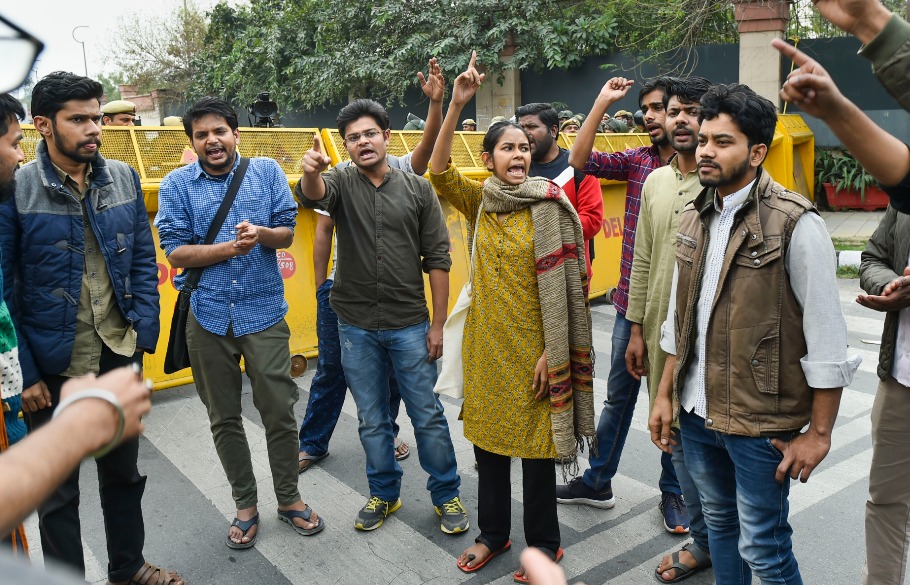
JNU: Students decry undue delay in student union elections

More than 3,000 students in Delhi’s prestigious Jawaharlal Nehru University (JNU) have launched a signature campaign seeking election to the students’ union suspended for the past three years.
Student representatives say the student community is facing multiple challenges due to the lack of a functional JNU Student’s Union and accuse the administration of deliberately not holding the election.
The university authorities deny the allegations, and insist that the elections will be held as soon as the admission process for the current academic session gets over.
The signature campaign has been organised by the Democratic Students Federation, one of the student groups active in JNU, a known leftist hub where Hindu rightwing groups have increasingly made their presence felt.
Also watch: Deliberate ploy to delay student union elections: JNU students
JNU history
Established in 1969, the JNU enjoys high academic reputation. Its alumni include Nobel laureate Abhijit Banerjee, former Libyan prime minister Ali Zeidan, former Nepal prime minister Baburam Bhattarai, and any number of Indian politicians, diplomats, academics and scientists. The university is spread over 1,000 acres and boasts of some 1,700 students.
Offline classes were suspended with the onset of the pandemic in March 2020, and so were the student union elections. Although normalcy has returned since February 2022, the student elections are yet to be held.
Saket Moon, the incumbent vice president of JNUSU, says that students face a host of issues including delays in hostel allotment, increased cases of sexual harassment, violation of reservation policies, delays in scholarship disbursal, and infrastructural issues owning to the huge fund cut in higher education.
Moon did not rule out that political compulsions could have prompted the administration to delay the poll process. He suggested that the authorities are holding off elections till they can be sure of having a union that shares a political alignment with India’s ruling dispensation.
Also read: Fresh violence in JNU: Was it more than just an ideological scuffle?
Moon said the perpetrators of the violence in the campus in February are yet to be arrested. “The trend is becoming clear. If the perpetrators are close to the ruling dispensation, there is an attempt to clear their names. Thereby, certain groups are indulging in campus violence with impunity.”
The Akhil Bharatiya Vidyarthi Parishad (ABVP), the student’s organisation of the BJP, claims that it wants the elections to be held but its rivals, along with the administration, are using “delaying tactics”.
“We have been seeking union elections for the past one year. It has been delayed for more than six months. All central universities have conducted their union polls. Now that the pandemic situation has normalised, the administration is saying that they need to refer the issue to experts citing provisions of Lyngdoh committee. These are all delaying tactics,” said Umesh Chandra Ajmera, President ABVP, JNU Unit.
He said the only agenda of communist organisations — SFI, AISA, DSF, AISF, and others — is to stop the rise of ABVP and it’s coming to power in the campus. “As the students’ support for ABVP has increased exponentially, the communists and leftists fear losing the elections and as such have been deliberately delaying the JNUSU elections with tacit understanding with the administration,” he said.
Importance of elections
Anagha Pradeep, a councillor in the current student union, has another view: “The primary reason student politics is important is that it teaches students democracy and democratic participation.”
Although the administration cites the on-going admission process as a reason for delaying elections, it is not clear why entrance and admission processes continue to be delayed well into 2023, almost one year since the regular academic functioning began, added Anagha.
The office bearers claim the union has since been rendered toothless by the administration.
Prof. Sudheer Pratap Singh, the Dean, denied this during his interaction with The Federal. He claimed that the administration remains committed to the idea of “campus democracy”.
University view
“Elections will be notified as early as possible. We are waiting for the admission process to get over. As soon as the PhD admissions get over, the formal process will kick in,” he said. Denying claims of a larger motive behind the delay, he said the Supreme Court has established rules regarding student unions. Can the JNU go against the apex court?
The ordinances relevant to the functioning of the decision-making bodies of JNU mandate the inclusion of the elected representatives of the JNUSU in their meetings.
Sarika Chaudhary, a former JNUSU vice-president, said: “The number of student representatives has diminished due to the JNUSU elections not having been held for an extended period of time. The decision-making bodies of the university have carried on with their functioning. This effectively has outrightly eliminated the representation of student opinion in the decision-making bodies”.
Student activists feel the administrative apathy violates the rules laid down by the Lyngdoh Committee, set up by the Human Resource Development Ministry in 2005 to streamline student elections.
The committee suggested a broad framework for conducting elections on campuses six to eight weeks from the start of the academic session. It said the entire election process should not exceed 10 days.
Lyngdoh Committee
The Lyngdoh Committee made it mandatory for all educational institutions, including private ones, to hold student elections in some form or the other. However, most institutions continue to ignore this basic tenet.
Will the ongoing signature campaign in JNU make a difference?

